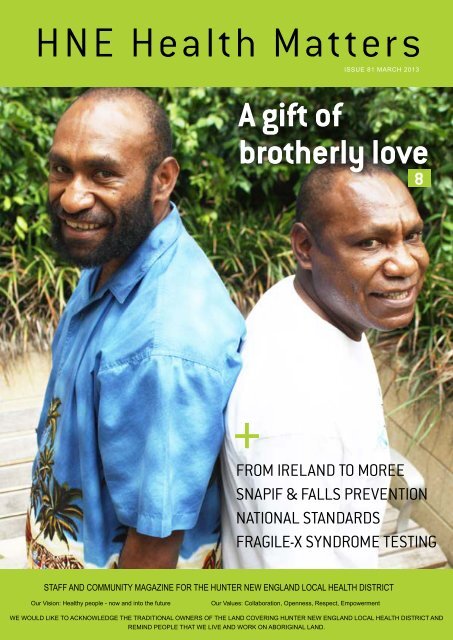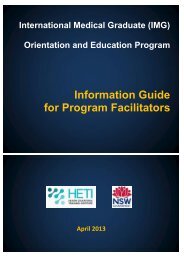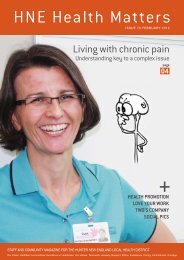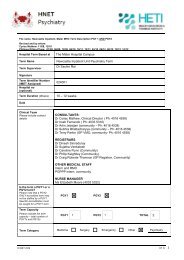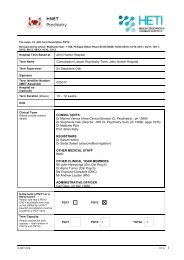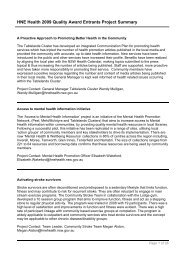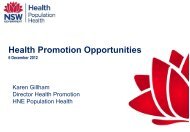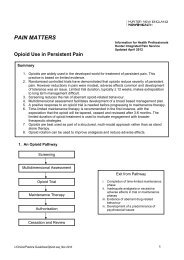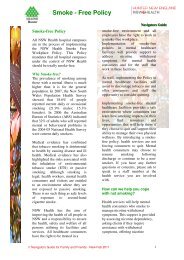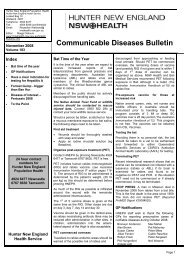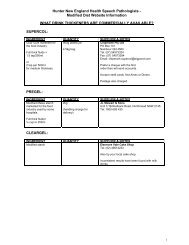March 2013 - Hunter New England Health - NSW Government
March 2013 - Hunter New England Health - NSW Government
March 2013 - Hunter New England Health - NSW Government
Create successful ePaper yourself
Turn your PDF publications into a flip-book with our unique Google optimized e-Paper software.
HNE <strong>Health</strong> Matters<br />
Issue 81 <strong>March</strong> <strong>2013</strong><br />
A gift of<br />
brotherly love<br />
8<br />
FROM IRELAND TO MOREE<br />
SNAPIF & FALLS PREVENTION<br />
NATIONAL STANDARDS<br />
FRAGILE-X SYNDROME TESTING<br />
STAFF AND COMMUNITY MAGAZINE FOR THE HUNTER NEW ENGLAND LOCAL HEALTH DISTRICT<br />
Our Vision: <strong>Health</strong>y people - now and into the future<br />
Our Values: Collaboration, Openness, Respect, Empowerment<br />
WE WOULD LIKE TO ACKNOWLEDGE THE TRADITIONAL OWNERS OF THE LAND COVERING HUNTER NEW ENGLAND LOCAL HEALTH DISTRICT AND<br />
REMIND PEOPLE THAT WE LIVE AND WORK ON ABORIGINAL LAND.
Features<br />
Message from the CE<br />
the recruitment process simpler<br />
– and it has worked a treat. (See<br />
page 3)<br />
4<br />
SNAPIF<br />
Entries for both the Quality Awards<br />
and the Achievement Awards<br />
open this month (page 7), and I’d<br />
like to urge everyone to consider<br />
nominating a colleague, leader or<br />
vollie who has gone above and<br />
beyond.<br />
EXCELLENCE<br />
AWARDS<strong>2013</strong><br />
Quality & Achievement<br />
6<br />
7<br />
National standards<br />
Saluting Excellence<br />
MICHAEL DiRIENZO<br />
CHIEF EXECUTIVE<br />
This month’s edition of <strong>Health</strong><br />
Matters draws together a wonderful<br />
collection of stories which reflect<br />
just how diverse and interesting<br />
our staff, volunteers and external<br />
partners really are.<br />
Many managers would agree that<br />
recruiting health professionals to<br />
work in rural and remote areas can<br />
be challenging. The team at Moree<br />
Community <strong>Health</strong> partnered with<br />
an external organisation to make<br />
In an example of essential clinical<br />
care overcoming financial and<br />
geographical challenges, I’m happy<br />
to say HNE <strong>Health</strong> was able to<br />
play a part in helping a Papua <strong>New</strong><br />
Guinean man undergo a successful<br />
kidney transplant. The story of the<br />
Kendaura brothers is heartwarming.<br />
(Page 8)<br />
Finally I’d like to encourage<br />
everyone to take part in this year’s<br />
Your Say staff survey. We want to<br />
find out what is working well and<br />
what we need to work on or do<br />
differently so that we can improve<br />
the culture in our workplaces. Your<br />
Say will be open from 25 <strong>March</strong> to<br />
26 April. (Page 14)<br />
Your say . . .<br />
13 Volunteer profile<br />
Would you like help to promote the good work of a HNE <strong>Health</strong> staff member,<br />
team, unit or service If so, HNE <strong>Health</strong> Matters is one way to do so.<br />
Will your idea ...<br />
• Show that your facility or team is dedicated to high quality, patientfocused<br />
care<br />
• Lend itself to a good photo/interview opportunity<br />
Pictured on front cover - steven kendaura, and dr kapiro kendaura<br />
• Be recent, revealing and relevant to readers<br />
If you have a story idea, please email <strong>Health</strong>Matters@hnehealth.nsw.gov.au<br />
or call the Communication Unit on 4985 5522. Readers are encouraged to<br />
provide feedback on HNE <strong>Health</strong> Matters and comment on stories. Please<br />
email us at <strong>Health</strong>Matters@hnehealth.nsw.gov.au<br />
HNE <strong>Health</strong> Matters is produced by the Communication Unit of <strong>Hunter</strong> <strong>New</strong> <strong>England</strong> <strong>Health</strong>.<br />
This bimonthly newsletter is distributed to staff across the organisation and to<br />
supporters across the region. If you’re a community member who would like<br />
to be added to the mailing list for this magazine, please call (02) 4985 5522<br />
and we’ll add your details to the database.<br />
Stories are written by the Communication Unit team. Contributions by staff<br />
are also welcome - please contact the Editor at<br />
<strong>Health</strong>Matters@hnehealth.nsw.gov.au<br />
Publication costs are subsidised by income raised from advertising.<br />
Editor: Janelle Kelly<br />
Communication Unit, <strong>Hunter</strong> <strong>New</strong> <strong>England</strong> <strong>Health</strong><br />
Phone: (02) 4985 5522<br />
Email: <strong>Health</strong>Matters@hnehealth.nsw.gov.au<br />
Advertising enquiries: Phone (02) 4985 5522<br />
We would love to hear what you think about HNE <strong>Health</strong> Matters. Send<br />
your feedback via the contact details above.
From Ireland to Moree, with no regrets<br />
Attracting health professionals to work in rural and remote areas is<br />
rarely an easy undertaking, particularly if they are overseas-trained.In<br />
fact, the process is notoriously challenging. Recruiters need to navigate<br />
the red tape associated with visas, sponsorship and qualifications. They<br />
also need to ‘sell’ the unique lifestyle that comes with country centres.<br />
But for the team at Moree Community <strong>Health</strong>, a recent overseas-trained<br />
nursing placement has proven refreshingly straightforward. And the<br />
keys to success have been a simple networking partnership, combined<br />
with some old-fashioned country hospitality.<br />
Margaret Hayes travelled more than 15,000 kms to take up her position<br />
as a Child and Family <strong>Health</strong> Nurse at Moree, and says she has had no<br />
regrets since arriving in Australia in November last year.<br />
“Moving your family to another continent is not an easy decision – in<br />
fact, many people warned us off the idea," Margaret said.<br />
"But we have felt really supported and encouraged every step of the way."<br />
Along with her husband Eamonn and two boys Timmy (15) and Jacob<br />
(8), Margaret has found life in Moree "wonderful", with the welcome<br />
received from locals described as "warm in every way".<br />
“My advice to others considering working in a rural area is to keep<br />
an open mind, and try not to have any preconceived ideas," said<br />
Margaret.<br />
"It will be different to what you might be used to, but if you take people<br />
and situations as they come, there are many, many benefits to living in<br />
the country".<br />
For Margaret, the professional transition from Northern Ireland to<br />
Moree has been smooth. She had spent the past 12 years working<br />
within regional communities as a <strong>Health</strong> Visitor, the UK-equivalent of a<br />
Child and Family <strong>Health</strong> Nurse.<br />
The transition was certainly made easier, however, thanks to the<br />
practical backing she received from HNE <strong>Health</strong> and the Rural<br />
Doctor’s Network (RDN).<br />
Moree Community <strong>Health</strong>’s Anne Lemmon worked closely with Emer<br />
O’Callaghan from the RDN’s Rural <strong>Health</strong> Professionals Program to<br />
secure Margaret’s placement, after recruitment for the child and family<br />
health position had proven unsuccessful for more than six months.<br />
"If it wasn’t for Emer and the Rural <strong>Health</strong> Professionals Program team,<br />
we would never have found Margaret, and she might not have found us,”<br />
Anne explained.<br />
The Hayes family with Anne Lemmon (right)<br />
“Emer guided us throughout, from initially putting us in contact with<br />
Margaret, then during the interview, vetting and appointment processes.<br />
She helped us arrange the relevant Australian training Margaret was<br />
required to complete before she could officially be appointed.<br />
“Although she’s based in <strong>New</strong>castle and I’m in Moree, Emer and I<br />
were able to establish an excellent working relationship via phone<br />
and email. She really has been a joy to work with and is an excellent<br />
communicator, and the end result is a staffing appointment that we are<br />
extremely happy with.”<br />
Anne also went above and beyond the call of duty in an effort to make<br />
Margaret and her family feel at home. She inspected rental properties<br />
on Margaret’s behalf and emailed her the relevant photos, collected<br />
Margaret and her family from the train when they arrived in Moree, and<br />
arranged a welcome barbecue at her own home. A gift basket was also<br />
arranged via Tourism Moree, which featured local food and information<br />
about the region and events.<br />
It really has been an invaluable experience in how to attract overseastrained<br />
staff to a regional community,” Anne said.<br />
“Working with Emer and the team has given me the confidence to<br />
pursue other overseas applicants and consider sponsorship, and to<br />
think outside the square when it comes to recruitment.”<br />
Tamworth redevelopment to benefit mums and bubs<br />
Mums and their babies from across the <strong>New</strong><br />
<strong>England</strong> North West will soon be cared for in<br />
one of the newest maternity units in the state.<br />
Next year construction will begin on the new<br />
Tamworth Hospital building, which will include<br />
the new maternity unit, birthing suites and<br />
special care nursery.<br />
"The brand new maternity unit, featuring 10<br />
single rooms with private ensuites, will give<br />
mums more privacy before and after they give<br />
birth,” said Tamworth Hospital Maternity Unit,<br />
Nurse Unit Manager Maureen Dawson.<br />
“Having private ensuites in each room will<br />
mean mums can stay in their room to use the<br />
bathroom rather than making the sometimes<br />
tiring walk to the shared bathroom at the end<br />
of the corridor.”<br />
An extra delivery room will be included in the<br />
new birthing unit, taking the capacity from<br />
three to four birthing rooms complete with<br />
island baths.<br />
“We have one older, shared bath in our current<br />
unit, so it’s excellent that all women will have<br />
access to a bath right in their delivery suite,”<br />
says Mrs Dawson.<br />
The new special care nursery will include 12 places<br />
compared to the six cots currently available.<br />
In time, and with more planning, the special<br />
care nursery will care for babies born at 32<br />
weeks. Right now all babies born under 34<br />
weeks are transferred to a more specialised<br />
hospital for care.<br />
“The change will mean we can care for<br />
children who have more serious conditions<br />
such as respiratory distress, and fewer<br />
families will have to follow their baby to a<br />
larger centre,” Mrs Dawson said.<br />
hnehealth.nsw.gov.au 3
SNAPIF - a happier, healthier community<br />
There is a new word for preventative health around the health service: It's S-N-A-P-<br />
I-F. The acronym helps everyone remember how to minimise the risk of ill health,<br />
infectious disease and injuries.<br />
Here’s how we spell out our Preventive Care program.<br />
Falls<br />
prevention<br />
When it comes falls prevention life begins at<br />
50. It’s an excellent time to review your level of<br />
fitness, to avoid having a fall further down the<br />
track.<br />
S<br />
Smoking<br />
make a plan to quit the habit<br />
Up to 30 per cent of <strong>NSW</strong> residents aged 65<br />
or older suffer a fall at least once a year. In the<br />
<strong>Hunter</strong> <strong>New</strong> <strong>England</strong> region in 2010/2011, we<br />
saw 4500 people who were over 65 presenting<br />
at hospital with fall injuries.<br />
N<br />
Nutrition<br />
eat more fruit and vegetables<br />
The latest <strong>NSW</strong> Population <strong>Health</strong> Survey<br />
calculates that up to 42 per cent of falls can be<br />
prevented by well-designed exercise programs.<br />
The programs that have the biggest effect<br />
on fall rates involve activities that challenge<br />
balance and develop lower limb strength as well<br />
as those undertaken for more than two hours a<br />
week over a six-month period.<br />
A<br />
Alcohol<br />
reduce unsafe drinking<br />
There’s someone in our organisation who<br />
devotes her working life to keeping our<br />
community standing firmly on two feet and<br />
walking with strength and confidence.<br />
P<br />
Physical<br />
find a physical activity and make it part<br />
of your regular routine<br />
She's Sue Green and she is the Community<br />
Falls Injury Prevention Strategies Project Officer<br />
for <strong>Hunter</strong> <strong>New</strong> <strong>England</strong> Population <strong>Health</strong>.<br />
“People believe that falls are something that<br />
happens to somebody else,” Sue said.<br />
I<br />
Immunisation<br />
ask your GP about protection against<br />
infections and diseases<br />
“But everybody is at risk of falls, and the biggest<br />
predictor of having a second fall is having the<br />
first fall.<br />
“If you catch people before they fall or when<br />
they’ve had their first fall, we can refer them<br />
F<br />
Falls<br />
work on ways to reduce the risk of falls,<br />
particularly if you are older<br />
Ultimately all these choices have an important bearing on the wellbeing of our<br />
communities. There’s one choice in particular which not only improves the health of<br />
people over 50; it can also improve mood, confidence and social networks.<br />
It’s exercise and in <strong>Health</strong> Matters this month, we look at the final letter in our<br />
acronym: F. It’s all about falls injury prevention.<br />
class participants at the australian tai chi institute, broadmea<br />
4
dow<br />
Project officer, Community Falls injury prevention<br />
strategies, sue green<br />
into programs that will help them develop their<br />
balance and leg strength.”<br />
This brings us to the heart of Sue Green’s<br />
work. For the last two years, she has been<br />
connecting with providers of community-based<br />
exercise programs across our district and<br />
encouraging them to list their programs in the<br />
<strong>NSW</strong> <strong>Health</strong> ‘Active and <strong>Health</strong>y’ web-based<br />
directory (www.activeandhealthy.nsw.gov.au).<br />
The site is easy to use. Just enter your<br />
suburb or town and you can find a range of<br />
exercise programs available in locations most<br />
convenient for you.<br />
“We want everyone to know about the Active<br />
and <strong>Health</strong>y site,” Sue said.<br />
As part of the Preventive Care program<br />
everybody who comes into contact with <strong>Hunter</strong><br />
<strong>New</strong> <strong>England</strong> Community <strong>Health</strong> Services is<br />
screened for health risk behaviours, including<br />
the risk of falling.<br />
“For people over 50 at low risk of falls, our<br />
advice is to go off and engage in communitybased<br />
programs, but it’s not just about physical<br />
activity. They need to challenge their balance,<br />
improve their leg strength and ideally, they need<br />
to devote two hours a week,” Sue said.<br />
<strong>Hunter</strong> <strong>New</strong> <strong>England</strong> <strong>Health</strong> has devised<br />
exercise programs which specifically cater for<br />
the needs of people aged 50 plus, including<br />
‘Active Over 50’s' in the <strong>Hunter</strong> and Lower Mid<br />
North Coast and ‘Balance and strength’ across<br />
<strong>New</strong> <strong>England</strong>, which are supported by external<br />
programs such as Heart Moves from the Heart<br />
Foundation. <strong>Health</strong> also offers support to<br />
a range of private providers to start up new<br />
programs in towns where programs are not<br />
currently available.<br />
“Sometimes we recognise that external<br />
programs don’t include enough balance and<br />
strength content and we work with these<br />
providers to re-design their activities,” says Sue.<br />
There is no re-design is necessary when<br />
it comes to Tai Chi. This graceful and<br />
deceptively simple Chinese martial art<br />
consistently shows evidence that participation<br />
reduces the risk of falls.<br />
Accredited Tai Chi providers across <strong>Hunter</strong><br />
<strong>New</strong> <strong>England</strong> see regular classes of older<br />
locals, going through the gentle movements<br />
that have such an impact on the quality of their<br />
lives.<br />
Nearly any activity which keeps us on our<br />
feet and moving can help to maintain good<br />
balance. In Tai Chi, people not only bend<br />
off centre and test their balance; they also<br />
improve leg strength through bending and<br />
stepping. Yoga, Pilates and Dance are among<br />
other activities which help to enhance balance.<br />
The Population <strong>Health</strong> experts are looking<br />
for one or more of these routines, when<br />
they assess the external programs for their<br />
potential to build balance and strength.<br />
“We have identified external accredited<br />
providers whose exercise programs will<br />
develop balance and leg strength,” Sue said.<br />
“We ask these providers to make sure that<br />
their programs are listed in the Active and<br />
<strong>Health</strong>y website, using the site’s home page<br />
registration function.<br />
“Whenever they change their classes, they can<br />
update their entry.”<br />
Regardless of age, weight, health problems<br />
or abilities, it is important for people aged<br />
over 50 to continue to be as physically active<br />
as possible, to help maintain their health and<br />
independence.<br />
“We try to get the word out to the community,<br />
before people become sedentary or overweight.<br />
“But even for those people who have become<br />
sedentary, small changes can make a big<br />
difference and all these efforts to maintain<br />
balance and leg strength can help people<br />
maintain independence in their own home.<br />
“Getting involved in some form of exercise<br />
can also put you in a better frame of mind, it<br />
can increase your confidence at home and in<br />
public and when you get involved in exercise<br />
programs, you widen your social circle.”<br />
“It doesn’t have to be a group exercise program,<br />
but these programs are a chance to meet<br />
new people and have a bit of fun and that’s<br />
motivation to continue attending.”<br />
In the perfect world, exercise is a lifelong pursuit,<br />
but it’s not always possible. The trouble is there<br />
are drawbacks if we don’t keep active.<br />
Societies are looking at simple ideas around<br />
the importance of standing, rather than sitting.<br />
Suggestions include workplace meetings where<br />
people stand rather than sit and meetings<br />
conducted while teams are out walking.<br />
Find some tips below on how to review your<br />
basic routine.<br />
How to stay<br />
balanced<br />
Exercises which challenge balance are<br />
those where people:<br />
• Stand with feet close together or on<br />
one leg (movement from one leg to<br />
the other).<br />
• Undertake exercises while standing<br />
with minimum use of hands to assist.<br />
• Undertake exercises with controlled<br />
movement of the whole body<br />
while standing (e.g. reaching while<br />
standing).<br />
You can inlcude specific balance exercises<br />
in your daily routine. For example:<br />
• Heel to toe standing<br />
• Knee raises<br />
• Heel to toe walking<br />
• Side leg raises<br />
• Sideways walking<br />
• Heel raises<br />
• Stepping up a step<br />
• Sit to stand exercises.<br />
hnehealth.nsw.gov.au 5
A better way to care:<br />
reaching the national standards<br />
manager of quality systems and risk, Gary martin<br />
They say consistency is the key to achieving<br />
your goals. That’s certainly true in the context<br />
of providing health care for our community.<br />
Excellence for every patient, every time is<br />
what we want for the people we provide care<br />
for.<br />
One of the ways we measure if we’re<br />
achieving this is through an accreditation<br />
program where our hospitals and health<br />
services are tested against a set of standards.<br />
For the first time, a national set of standards<br />
for safety and quality in healthcare has been<br />
developed in Australia, bringing with it a level<br />
of consistency that hasn’t been seen before.<br />
The National Safety and Quality <strong>Health</strong><br />
Service Standards were developed by the<br />
Australian Commission on Safety and Quality<br />
in <strong>Health</strong> Care to improve the quality of health<br />
care nationally.<br />
There are 10 standards that clearly articulate<br />
what level of health care consumers can expect.<br />
In late 2011, the health ministers from every<br />
state endorsed the 10 standards and agreed<br />
to a national accreditation scheme.<br />
“This was an historic agreement, which has<br />
implications for the way our hospitals and<br />
health services will be accredited,” Manager of<br />
Quality Systems and Risk Gary Martin said.<br />
“The Executive Leadership Team has decided<br />
that we will transition our accreditation<br />
program to the national standards during<br />
<strong>2013</strong>, with the aim of being accredited<br />
exclusively using the new standards from<br />
2014.<br />
“The Australian Council on <strong>Health</strong>care<br />
Standards (ACHS) will continue to be our<br />
accreditation provider.”<br />
A national accreditation program will bring<br />
benefits for patients as well as allowing<br />
<strong>Hunter</strong> <strong>New</strong> <strong>England</strong> <strong>Health</strong> to benchmark<br />
itself against the rest of the country.<br />
“The focus is really on getting the core<br />
things right so there’s a strong foundation<br />
for the care we’re providing,” Gary said.<br />
“The standards are quite demanding and<br />
our executive team is keen for them to<br />
become part of normal business for us.”<br />
There are 256 actions across the 10<br />
standards that organisations are required<br />
to meet and all of the actions must be met<br />
to pass accreditation.<br />
“They will bring quite positive benefits for<br />
patient care,” he said.<br />
The standards were put together following<br />
extensive consultation with the community<br />
and senior clinicians, including some<br />
senior doctors from <strong>Hunter</strong> <strong>New</strong> <strong>England</strong><br />
<strong>Health</strong>.<br />
“Quality programs have appeared in the<br />
health arena for over a decade and a lot<br />
of progress has been made in that time to<br />
improve the safety and quality of care and<br />
decrease the number of incidents,” Gary<br />
said.<br />
“But there is always improvement to be made<br />
and what impresses me about the national<br />
standards is that they are designed to<br />
generate real system change.<br />
“We need to build our local health district on<br />
good foundations and the national standards<br />
will be an important part of this,” he said.<br />
“The standards fit neatly with our agenda of<br />
excellence for every patient, every time – and<br />
having everyone demonstrating that they are<br />
doing their jobs with excellence.”<br />
What this means for us<br />
<strong>Hunter</strong> <strong>New</strong> <strong>England</strong> <strong>Health</strong> has 14<br />
“accreditation memberships” across the<br />
district. This includes eight services within<br />
the Primary and Community Network, one<br />
in Mental <strong>Health</strong> and six within the Acute<br />
Network.<br />
Every cluster and acute network has a quality<br />
coordinator whose job includes assisting<br />
services with preparation for the accreditation<br />
process.<br />
“Clinical Governance has undertaken an<br />
analysis at a district level to identify where<br />
we might have gaps between what we were<br />
required to have in place in the past and<br />
what the new national standards will require,”<br />
Manager of Quality Systems and Risk Gary<br />
Martin said.<br />
The 10 National Standards for<br />
Safety and Quality in <strong>Health</strong> Care<br />
Standard 1: Governance for safety<br />
and quality in health service<br />
organisations<br />
Standard 2: Partnering with<br />
consumers<br />
Standard 3: Preventing and<br />
controlling health care associated<br />
infections<br />
Standard 4: Medication safety<br />
Standard 5: Patient identification<br />
and procedure matching<br />
Standard 6: Clinical handover<br />
Standard 7: Blood and blood<br />
products<br />
Standard 8: Preventing and<br />
managing pressure injuries<br />
Standard 9: Recognising and<br />
responding to clinical deterioration<br />
in acute health care<br />
Standard 10: Preventing falls and<br />
harm from falls<br />
“A set of recommendations has been<br />
developed to address these gaps.”<br />
As part of this, the Executive Leadership Team<br />
has appointed an executive leader for each of<br />
the 10 standards to drive the process forward<br />
and clinical sub-committees have produced a<br />
suite of fact sheets on every standard.<br />
“Some services, including the McIntyre<br />
Cluster, the Upper <strong>Hunter</strong> Cluster and Mental<br />
<strong>Health</strong> have already undergone their own gap<br />
analysis,” Gary said.<br />
“The evidence requirements of the new<br />
standards are pretty significant, so it’s<br />
important that we are as prepared as we can<br />
be.”<br />
So it’s all hands on deck to prepare for the<br />
transition.<br />
“Everyone’s furiously working away,”<br />
Gary said. “All of our services that require<br />
accreditation will be tested on a minimum of<br />
standards one, two and three by December<br />
<strong>2013</strong>,” he said.<br />
<strong>Hunter</strong> <strong>New</strong> <strong>England</strong> <strong>Health</strong> will transition fully<br />
to the National Standards exclusively in 2014.<br />
If you would like more information<br />
contact Clinical Governance or visit www.<br />
safetyandquality.gov.au/our-work/accreditation/<br />
6
A fresh approach to saluting Excellence<br />
Do you know a colleague,<br />
leader or volunteer who<br />
displays exceptional skills<br />
or qualities in their everyday<br />
work<br />
Perhaps you know someone<br />
who literally deserves to have<br />
their name up in lights<br />
<strong>Hunter</strong> <strong>New</strong> <strong>England</strong> <strong>Health</strong>’s<br />
annual awards program helps<br />
recognise and celebrate<br />
outstanding individual and<br />
team achievements, as well<br />
as commitment to innovation<br />
and quality of care for our<br />
patients.<br />
This year the awards have been refreshed to more strongly align to<br />
HNE <strong>Health</strong>’s strategic goals and the principles of Excellence.<br />
The overall program has been renamed the Excellence Awards, and<br />
will feature both the Quality Awards as well as a refined number of<br />
Achievement Awards.<br />
“Each year our staff work tirelessly to deliver high quality care for<br />
patients, and each year I’m pleased to hear about teams who go<br />
above and beyond the call of duty to provide services that exceed<br />
expectations. The <strong>2013</strong> Excellence Awards are designed to capture<br />
this spirit and commitment,” Chief Executive Michael DiRienzo said.<br />
EXCELLENCE<br />
AWARDS<strong>2013</strong><br />
Quality & Achievement<br />
The <strong>2013</strong> Excellence Awards dinner<br />
will be held on Wednesday, 21<br />
August at <strong>New</strong>castle City Hall. At<br />
the event, winners of the Quality<br />
Awards and Achievement Awards<br />
will be announced.<br />
The refined Achievement Award<br />
categories now include Leader<br />
of the Year, Clinical Team of the<br />
Year, Support Team of the Year,<br />
Outstanding Contribution, and<br />
Volunteer/s of the Year. There will<br />
also the opportunity for the Chief<br />
Executive to give an "Excellence<br />
Award".<br />
Quality Award categories are likely to include Keeping People<br />
<strong>Health</strong>y to Avoid Unnecessary Hospitalisation, Improving Access<br />
to Timely Quality <strong>Health</strong> Care -Improving Quality and Safety, and<br />
Improving Access to services when and where needed, Empowering<br />
Patients, Improving Primary <strong>Health</strong> Care in the Community,<br />
Collaboration – Working as a team and Building the <strong>Health</strong><br />
Workforce<br />
If you know of a high achiever who deserves recognition, be sure to<br />
nominate them in this year’s awards program. Entries for both the<br />
Quality Awards and Achievement Awards open in early <strong>March</strong>. Keep<br />
an eye on the intranet page http://intranet.hne.health.nsw.gov.au/<br />
awards for information as it comes to hand.<br />
do the numbers<br />
it’s elementary, our<br />
home loans are<br />
better value.<br />
Call 1300 655 116<br />
Visti mycu.com.au<br />
Important notes: Eligibility, lending criteria, terms, conditions and fees apply.<br />
My Credit Union Limited | Australian Credit Licence Number 246 941.<br />
hnehealth.nsw.gov.au 7
Kidney transplant a gift of brotherly love<br />
Steven Kendaura would do anything for his<br />
big brother, but the gift that Steven offered did<br />
cause some turmoil for Kapiro Kendaura.<br />
Steven, a robust 36-year-old school teacher,<br />
wanted to donate one of his kidneys to save<br />
his brother’s life.<br />
“Steven’s a healthy sort of bloke and for him<br />
to go into all that… it’s a big stress for him,<br />
psychologically and physically, and he’s got a<br />
young family, so I was really troubled inside,”<br />
Kapiro Kendaura said.<br />
But Steven’s mind was set and his decision<br />
was part of a cascade of events and kindness<br />
which saved Kapiro's life and restored him to a<br />
community that depends on the 38-year-old.<br />
Kapiro Kendaura is a doctor. He was acting<br />
Director of Medical Services at Goroka<br />
Hospital in Papua <strong>New</strong> Guinea, when kidney<br />
failure turned him into a patient; a patient with<br />
only months to live.<br />
Needing specialist care, Kapiro was<br />
transferred to Port Moresby Hospital, where he<br />
confronted the idea that time was closing in.<br />
“I’ve been into the grave, walking in the valley<br />
of death,” he said.<br />
But a chance encounter spun destiny’s wheel.<br />
John Ferguson, the Director of Infection<br />
Prevention and Control for <strong>Hunter</strong> <strong>New</strong><br />
<strong>England</strong> <strong>Health</strong>, was making one of his regular<br />
lecture tours to Port Moresby, when he learned<br />
of Kapiro’s situation.<br />
The PNG medical fraternity was fundraising<br />
to pay for Kapiro’s care and dialysis, but the<br />
money was running out.<br />
Dr Ferguson went to work on a complex plan;<br />
a plan that would involve diplomats, medical<br />
authorities in both countries, the specialist<br />
transplant team at John <strong>Hunter</strong> Hospital, and<br />
the staff of <strong>Hunter</strong> <strong>New</strong> <strong>England</strong> (HNE) <strong>Health</strong>.<br />
Money was donated by staff to a special fund<br />
to aid Kapiro’s medical rescue.<br />
When Steven stepped forward, offering<br />
himself as a donor, the plan accelerated, but<br />
urgent visas were required, including medical<br />
clearances to allow Kapiro’s transfer to<br />
Australia. He had suffered TB as a child and<br />
there would be no transfer until tests showed<br />
he was clear of disease.<br />
The brothers have a strong Christian faith and<br />
they prayed as the obstacles were steadily<br />
moved aside.<br />
Travelworld <strong>New</strong>castle stepped in to pay for<br />
some of the airfares and in late October 2012,<br />
the Kendaura brothers arrived at John <strong>Hunter</strong><br />
Hospital. They met their transplant physician,<br />
Dr Paul Trevillian, who is director of the<br />
hospital’s transplant unit. The men were also<br />
introduced to the transplant surgical team,<br />
director of infection prevention and control, dr john feguson, steven kendaura, dr kapiro kendaura & director o<br />
Dr Phillip Sprott and Dr Munish Heer, and<br />
transplant coordinators, Ann Stein and Deidre<br />
Davidson.<br />
As Kapiro attended dialysis sessions, Steven<br />
was briefed about the process and prepared<br />
for the donation of his kidney. His wife Andi<br />
and their daughter were with him all the way.<br />
“I’ve been a bit scared because I’ve never<br />
been through any kind of major operation so I<br />
was a bit fearful, but I know that the good Lord<br />
is with us and everything will run smoothly.<br />
“My faith helps me through the operation,”<br />
Steven said.<br />
In early December, the transplant went ahead.<br />
Three days later, Dr Trevillian shared a crucial<br />
message:<br />
“Great news! Kapiro’s biopsy shows no<br />
rejection. Steven is also making an excellent<br />
recovery."<br />
Today, two months since surgery, Kapiro is<br />
doing very well and he’s about to resume<br />
work in Goroka, this time as the head of the<br />
region’s new clinical school.<br />
Kapiro will need years of ongoing support<br />
in PNG and might he need assistance to<br />
maintain treatment with the expensive<br />
immunosuppressive medication.<br />
Acts of compassion and kindness can often<br />
resonate into the future, and we’re seeing that<br />
now.<br />
The staff fund which helped the Kendaura<br />
family will stay in operation, operating as the<br />
PNG Compassionate Project Fund, ready to<br />
lend support for future medical rescues.<br />
Back in PNG, Kapiro confronts a troubling fact<br />
about kidney disease in his country.<br />
“Right now, 90 per cent of people with kidney<br />
problems die, because we don’t have dialysis<br />
set up in public hospitals," he said.<br />
His faith and his energy are now squarely<br />
focused on these machines.<br />
Kapiro says he doesn’t know how to thank all<br />
the people who stood with him on his journey.<br />
But he may be staring at the answer. His<br />
benefactors could think of no better result<br />
than a campaign to save even more people,<br />
in a country that struggles to achieve the level<br />
of medical care other countries accept as<br />
normal.<br />
Kapiro will work to build his medical networks<br />
in Australia and around the world, hopefully<br />
finding ways to source the dialysis equipment<br />
that could extend the lives of so many of his<br />
compatriots.<br />
8
Keeping kidneys viable<br />
Dr Paul Trevillian is also a proud advocate of the newly established <strong>Hunter</strong> Transplant<br />
Research Foundation.<br />
The partnership with the <strong>Hunter</strong> Medical Research Institute, the foundation is conducting<br />
translational research into projects that will directly benefit patients undergoing renal<br />
transplantation.<br />
The Foundation has two main goals:<br />
• The first is the investigation of ways to maintain the condition of kidneys from a<br />
deceased donor. For all the advances in transplantation, kidneys still suffer damage<br />
while diffused in cold solutions. The bodies of recipients detect that damage and try to<br />
kill the damaged cells, complicating recovery. The researchers are looking for ways to<br />
mask the damage in donor kidneys to minimise the rejection process in the recipient.<br />
• The second crucial arm of the research involves transplantation tolerance. The team<br />
is looking for ways to give initial treatment to transplant recipients, which would mean<br />
they don’t have to take anti-rejection drugs for the rest of their life.<br />
Potentially, it’s research that will increase the availability of viable donor kidneys and<br />
improve the longer term survival of donor recipients. This research also has the potential<br />
to discover a range of benefits outside of transplantation, assisting patient groups such as<br />
stroke and heart attack victims.<br />
You will hear much more about this ground-breaking team.<br />
f tansplant services dr paul trevillian<br />
inNovated Leasing<br />
It’s Simply About Paying Less For Your Car & Expenses<br />
Existing, <strong>New</strong> & Used<br />
Lower Purchase Price – GST Free + Discounts<br />
Lower Running Expenses<br />
Hassle Free buying<br />
* The distance you drive is not important<br />
You save money because of how you pay for your car (& expenses),<br />
not from how far you drive.<br />
Owning a car has now become easier<br />
Car Purchasing Discounts<br />
Your choices don’t change<br />
All that changes is how you pay for your car<br />
& of course, how much more salary you take home<br />
To see how much you will save, go to : inNovated.com.au<br />
or email : info@inNovated.com.au<br />
Obligation Free Consultation<br />
or call : 1300 787 785<br />
hnehealth.nsw.gov.au 9
Clinician opinion<br />
Palliative Care Research<br />
Calvary Mater <strong>New</strong>castle<br />
Conducting research in palliative care is imperative to ensure that<br />
people with palliative care needs receive quality, evidence-based<br />
care. It is important that regardless of whether or not a patient with<br />
palliative care needs is seen by a palliative care service, the patient<br />
will have the same access to evidence-based recommendations.<br />
Many people do not realise the difficulties involved in accessing<br />
medications faced by patients who wish to remain in their own<br />
homes.<br />
For people who want to receive palliative care at home, often they<br />
are unable to access or afford the medications they need. This is<br />
a particular problem for patients who are living lengthy distances<br />
away from specialist palliative care services.<br />
The use of medications to help maintain quality of life during the<br />
terminal phase is an important aspect of palliative care currently<br />
being addressed under the National Palliative Care Program. One<br />
of four key goals of the program is to improve access to palliative<br />
care medications in the community.<br />
The Department of Palliative Care at Calvary Mater <strong>New</strong>castle first<br />
became involved in clinical trials in August 2008; since then we<br />
have expanded in both the number of studies we are involved in<br />
and the number of designated research staff.<br />
Most of the clinical trials conducted in our unit are funded by the<br />
Palliative Care Clinical Studies Collaborative who were formed<br />
under the National Palliative Care Program.<br />
Supporting access to appropriate medicines to help maintain<br />
comfort and function during the terminal phase of a person’s life<br />
when people are being cared for at home is one the main focus of<br />
the collaborative.<br />
The research we do assists to gain the evidence to support the<br />
addition of medications to be listed on the pharmaceutical benefits<br />
for palliative care. This will allow a greater number of people<br />
receiving palliative care to access their medicines in the community<br />
at a more affordable cost.<br />
Naomi Byfieldt, Clinical Trial Coordinator and Conjoint Professor<br />
Katherine Clark, Director<br />
Love your work<br />
Annie Inder<br />
Nursing Unit Manager,<br />
Upper <strong>Hunter</strong> Community<br />
<strong>Health</strong><br />
Tell us about your role. Can<br />
you describe a typical day<br />
Busy! Unpredictable!<br />
There’s no such thing<br />
as a typical day. Liaising<br />
with staff, clients and<br />
other service providers<br />
is part of everyday, as is<br />
reviewing and adjusting<br />
service delivery to meet the<br />
needs of our community<br />
and our organisational<br />
goals, while providing the<br />
best community nursing<br />
services possible.<br />
When and why did you decide<br />
to become a nurse and<br />
what have been the most<br />
significant changes you've<br />
noticed<br />
nurse unit manager, Annie inder<br />
After working as a legal<br />
secretary and becoming bored with an Arts degree, I decided training<br />
as a nurse (yes, hospital-based) meant I could learn useful information<br />
and earn money at the same time. I was attracted by the opportunity<br />
to make a positive difference in the lives of people when they are most<br />
vulnerable.<br />
The most significant change I’ve noticed in nursing is moving the focus<br />
back to the patient, with improvements in quality and patient safety.<br />
What do you love about your job/what do you find most challenging<br />
I love the unpredictable nature of my work, and I respect the expertise of<br />
the highly skilled nursing team caring for clients from pre-birth to earth<br />
and beyond.<br />
Most challenging is supporting and leading these wonderful people<br />
to juggle the demands upon them to provide the best care for the<br />
community, and implement services in an atmosphere of changing<br />
expectations.<br />
What would you say to someone considering coming to work for <strong>Hunter</strong> <strong>New</strong><br />
<strong>England</strong> <strong>Health</strong><br />
I’m really proud of HNE <strong>Health</strong>’s adoption of Excellence. I believe it<br />
has made a huge difference to the way we conduct our business. I feel<br />
privileged to be a part of our new culture and would encourage others<br />
who aim for excellence in healthcare to join our team.<br />
What do you do in your free time that helps you create a work/life balance<br />
I have a farming husband and four children who all keep me busy. I<br />
must read to keep sane, and wish I could see more movies (the closest<br />
cinema is 1.5 hours away). I need coffee with friends, and listen to audio<br />
books on the long drive home from work. I am partial to both focused<br />
and unfocused shopping, as well as compiling rosters and 90-day action<br />
plans. Work/life harmony… I’m working on it!<br />
10
Kaleidoscope news<br />
Mothers support newborn testing for Fragile X Syndrome<br />
<strong>Hunter</strong> Genetics GOLD Service Genetic Counsellors Jackie Boyle_Louise Christie and Carolyn Rogers<br />
Fragile X Syndrome (FXS) is the most common cause of inherited<br />
intellectual disability, affecting one in 4000 males and one in 6000 females.<br />
Children with FXS do not have any physical features of the condition<br />
at birth, which means the diagnosis is often delayed until parents or<br />
health professionals become concerned about the child’s developmental<br />
milestones.<br />
In the first study of its kind in Australia, the Genetics of Learning Disability<br />
(GOLD) service at <strong>Hunter</strong> Genetics has found overwhelming support for<br />
newborn screening for FXS in postnatal mothers.<br />
Genetic Counsellor Louise Christie said worldwide, FXS testing is not<br />
currently included in routine newborn screening. In this study, mothers<br />
were offered the option of including FXS testing into their newborn’s<br />
routine newborn screening by testing DNA extracted from the ‘heel prick’<br />
sample.<br />
“<strong>New</strong>born screening for FXS can provide an earlier diagnosis, alleviating<br />
the diagnostic odyssey for parents and allowing access to earlier<br />
interventions,” Ms Christie said.<br />
“It can also inform parents and extended family members of the FXS in the<br />
family and the option of future reproductive choices.<br />
“In Australia, the mean age of diagnosis is 5.5 years and many families<br />
have a second child before the diagnosis is made,” she said<br />
The study demonstrated a high uptake of newborn testing for FXS (94%)<br />
with 2000 male and female newborns tested. Even though there is no cure<br />
for FXS, mothers considered an early diagnosis as beneficial and wanted<br />
the information to prepare for a child with additional needs.<br />
More than two thirds of mothers wanted the information to assist in future<br />
reproductive planning. Mothers showed little concern that the testing could<br />
also detect carriers of FXS and the health implications for adult carriers.<br />
The research was undertaken in collaboration with the Department of<br />
Obstetrics and Gynaecology at John <strong>Hunter</strong> Hospital, the Department of<br />
Molecular Genetics and <strong>New</strong>born Screening Program at The Children’s<br />
Hospital, Westmead and is being published as a feature article in the<br />
American Journal of Medical Genetics Part A in February <strong>2013</strong>.<br />
A smarter way to earn<br />
Something worth celebrating!<br />
Did you know you can salary package the cost of your next celebration<br />
As an employee of <strong>Hunter</strong> <strong>New</strong> <strong>England</strong> <strong>Health</strong>, this is just one of the<br />
many cost saving benefits available to you. Simply contact the<br />
Prosperity Salary Packaging team to find out more.<br />
For more information or to setup a no obligation consultation please<br />
call Prosperity Salary Packaging on 1300 761 388 or email your<br />
contact details to mail@prosperitysalarypackaging.com.au.<br />
T 1300 761 388<br />
mail@prosperitysalarypackaging.com.au<br />
www.prosperitysalarypackaging.com.au<br />
hnehealth.nsw.gov.au 11
Three's company<br />
Team Leader, Jennifer Duncan,<br />
Project Officer, Aimee Stazak & Data<br />
Analyst Rhonda Walker<br />
team leader jennifer duncan, project officer, aimee stazak & data analyst, Rhonda walker<br />
The team responsible for delivering a clinical<br />
services plan for the <strong>Hunter</strong> Valley is a meeting<br />
of three very different skill sets.<br />
Team Leader Jennifer Duncan, Data Analyst<br />
Rhonda Walker and Project Officer Aimee<br />
Stazak – the Leader, the Number Cruncher<br />
and the Task Master – make up the <strong>Hunter</strong><br />
Valley <strong>Health</strong> Services Planning Team. Each<br />
brings something different to the team and their<br />
different backgrounds are serving them well.<br />
Leadership is nothing new for Jennifer. In<br />
addition to running a busy household (complete<br />
with two very hyperactive puppies); she has<br />
managed occupational therapists at Maitland<br />
Hospital and throughout the <strong>New</strong>castle area and<br />
been involved in the redesign of rehabilitation<br />
services at Maitland Hospital.<br />
The <strong>Hunter</strong> Valley project presented the<br />
opportunity to apply her skills in a different way.<br />
“I felt really inspired when this project came up. It<br />
seemed like a really good opportunity to connect<br />
with the community and staff across the region,”<br />
Jennifer said.<br />
“The transition from managing a large team<br />
providing frontline services across a large<br />
geographical area to having a small team in the<br />
next room has been an exciting challenge. We<br />
really support one another and everyone brings<br />
something to the table.”<br />
Rhonda, who comes from a data management<br />
and epidemiology background, couldn’t<br />
agree more. “I really enjoy our team – we all<br />
communicate well with each other and we<br />
work well together because we have similar,<br />
straightforward natures.”<br />
In addition to working in HNE <strong>Health</strong>, Rhonda<br />
also lectures in Quality and Safety in <strong>Health</strong><br />
Care at the University of <strong>New</strong>castle, and says<br />
her two roles complement one another.<br />
“Working with students and their projects<br />
exposes me to the practicalities and challenges<br />
faced by health professionals. These insights<br />
help me keep the people in mind when I’m<br />
working numbers as part of the planning team.”<br />
Aimee also takes her work into the classroom,<br />
but as a student. In between renovating her<br />
house, planning a wedding and working fulltime<br />
on the project, she is also studying for a Masters<br />
of <strong>Health</strong> Services Management.<br />
Although she has worked in Planning and<br />
Performance for a number of years, she<br />
still loves working in such a dynamic and<br />
challenging environment.<br />
“I’m really enjoying the project because we’re<br />
out talking to the community and working<br />
towards equitable health outcomes for<br />
everyone in the <strong>Hunter</strong> Valley. Plus, I can use<br />
the theoretical knowledge I am learning in my<br />
studies and apply it practically in my work,” she<br />
said.<br />
“Jennifer and Rhonda have such a passion for<br />
<strong>Health</strong>, we work really well as a team.”<br />
The Leader, the Number Cruncher and the Task<br />
Master have embarked on the second round of<br />
staff and community consultations throughout<br />
the <strong>Hunter</strong> Valley, responding to issues and<br />
concerns raised in earlier consultations and<br />
consolidating plans for the future of health<br />
services in the region.<br />
Visit www.hnehealth.nsw.gov.au/hunter_<br />
valley_health_services for more information.<br />
Alternatively, direct any questions to the project<br />
team (email hne-hvp@hnehealth.nsw.gov.au or<br />
call 02 4939 2280).<br />
12
Volunteer profile<br />
Alysha Gill,<br />
Occupational<br />
Therapy Volunteer<br />
When Alysha Gill proudly graduated from the<br />
University of <strong>New</strong>castle in 2012 with a Bachelor<br />
of Occupational Therapy (Honours), she<br />
graduated with experience most of her fellow<br />
students did not have.<br />
For the past eight months 23-year-old Alysha has<br />
been a volunteer with the Occupational Therapy<br />
Department at John <strong>Hunter</strong> Children’s Hospital.<br />
The motivation to volunteer came about following<br />
a three month placement at the children’s<br />
hospital for her degree.<br />
“I enjoyed the placement so much I enquired<br />
about becoming a volunteer while completing my<br />
degree,” Alysha said.<br />
“I do not see volunteering as a commitment, but a<br />
fulfilling experience. I know every time I leave the<br />
hospital I have made a difference in some way,”<br />
she said.<br />
John <strong>Hunter</strong> Children’s Hospital Occupational<br />
Therapist Rachael Fallon said having a volunteer<br />
who was in the later stages of their degree also<br />
assisted the Occupational Therapy Department<br />
with handwriting sessions and the evaluation of<br />
groups.<br />
“As Alysha had already spent time with us as a<br />
student she already knew how groups were run<br />
and was great assistance with guiding the clients<br />
during the group’s sessions,” Rachael said.<br />
“Having Alysha as a volunteer has provided<br />
therapists with additional time to run groups and<br />
the OT assistant to attend to other client matters.<br />
Alysha has seen her time to date as a way<br />
of giving back to the community and gaining<br />
valuable training.<br />
“My university lecturer encouraged all students<br />
to engage in paid or un-paid work that had<br />
transferrable skills to occupational therapy,”<br />
Alysha said.<br />
“I thought this was excellent advice, which is why<br />
I pursued volunteering following my placement.<br />
“There are many opportunities to learn new skills<br />
which are relevant to future career paths,” she<br />
said.<br />
Fresh faces welcomed<br />
Every year HNE <strong>Health</strong> sees a changing of the<br />
guard as we welcome a new intake of nursing<br />
and midwifery graduates.<br />
Nurses and midwives play a major role in<br />
coordinating care, and they are vital in our goal<br />
to deliver excellence, for every patient, every<br />
time.<br />
<strong>New</strong> grads can choose to work in a range<br />
of clinical settings, from our largest facility<br />
John <strong>Hunter</strong> Hospital, to some of our smallest<br />
facilities such as Barraba Multipurpose Service.<br />
<strong>New</strong> graduates can also choose to spend their<br />
(L-R) Federal Member for Parkes Mark Coulton, Debbie Key, Susan Sargent,<br />
Sherri Shannon, Jessica Martin, Melissa Nelson, Claire Horton and <strong>NSW</strong><br />
Minister for Mental <strong>Health</strong> The Hon. Kevin Humphries.<br />
first year in our mental health facilities.<br />
Six new midwives joined maternity units across<br />
the <strong>New</strong> <strong>England</strong> region last month (February)<br />
following their graduation from HNE <strong>Health</strong>'s<br />
Rural Midwifery Education Program.<br />
After a challenging year of full-time study<br />
and on-the-job training with dedicated senior<br />
midwives at Armidale, Inverell, Moree, Narrabri<br />
and Tamworth, Claire Horton, Melissa Nelson,<br />
Debbie Key, Sherri Shannon, Susan Sargent<br />
and Jessica Martin entered the workforce as<br />
fully fledged midwives.<br />
All six graduates plan to<br />
continue working in the<br />
<strong>New</strong> <strong>England</strong> region.<br />
Claire and Melissa are<br />
at Armidale, Debbie is<br />
at Inverell, Sherri takes<br />
up a post in Moree,<br />
Susan is in Narrabri, and<br />
Jessica is working in<br />
Tamworth.<br />
Now in its 20th year,<br />
the program has trained<br />
more than 95 midwives,<br />
many of whom have<br />
stayed within the region<br />
providing care in local<br />
maternity units.<br />
Between the<br />
Flags<br />
The Clinical Excellence Commission will<br />
next month (April) conduct a number of<br />
site visits within HNE <strong>Health</strong>, to support<br />
the progress of the Between the Flags<br />
program.<br />
Feedback will be sought from clinicians<br />
and managers on the successes and<br />
challenges of the program, with HNE<br />
<strong>Health</strong>’s Clinical Governance team<br />
coordinating the visit.<br />
The Between the Flags program is<br />
designed to establish a 'safety net' in all<br />
<strong>NSW</strong> public hospitals and healthcare<br />
facilities that reduces the risks of<br />
patients deteriorating unnoticed and<br />
ensures they receive appropriate care in<br />
response if they do.<br />
The program uses the analogy of Surf<br />
Life Saving Australia's Lifeguards<br />
and Life Savers who keep people<br />
safe by ensuring they are under close<br />
observation and rapidly rescue them,<br />
should something go wrong. For more<br />
go to: www.cec.health.nsw.gov.au/<br />
programs/between-the-flags<br />
hnehealth.nsw.gov.au 13
<strong>New</strong>s in brief...<br />
50 years of nursing in Bingara<br />
Judith Abra is taking some time to reflect and celebrate as she marks 50 years of<br />
nursing, mostly achieved in her home town of Bingara.<br />
She started training at St George Hospital in Sydney on 31 January,<br />
1963 and by1967 she was fully qualified, and working back at Bingara,<br />
a place she cherishes for its people and landscape. It’s also the place<br />
where she met her husband Trevor and raised two sons.<br />
“I am so glad for my career. I wouldn’t have been who I am without it.<br />
It has been a wonderful journey,” Judith said.<br />
Judith attempted to retire 10 years ago, but she kept the door open to<br />
part-time duty, so the work never stopped.<br />
“I’ve had lots of wonderful moments, good times, sad times, but the<br />
good outweigh the bad," she said.<br />
“The worst part of a country hospital; you deal with the emergency and<br />
you deal with knowing the person. You become very strong.”<br />
The staff of Bingara MPS helped Judith celebrate with a dinner at The<br />
Playhouse Barraba.<br />
Friends and colleagues join judith to celebrate her 50 years of nursing<br />
There’s another celebration still ahead; 11 nurses who started training<br />
at St George on that very same Thursday back in 1963 will join Judith for a dinner at<br />
Bingara’s Imperial Hotel later this year.<br />
<strong>Hunter</strong> Valley <strong>Health</strong><br />
Services planning project<br />
The next round of consultations for the<br />
<strong>Hunter</strong> Valley <strong>Health</strong> Services Planning<br />
Project has begun.<br />
population and ageing health infrastructure,<br />
the plan is likely to show that business as<br />
usual is not an option,' Dr Carter said.<br />
Your say staff<br />
survey<br />
The project team (see Three’s Company<br />
on page 12) will again be consulting widely<br />
with HNE <strong>Health</strong> staff, clinicians and<br />
community representatives from across<br />
the <strong>Hunter</strong> Valley as it continues to build<br />
a picture of the type of health services<br />
needed for the future and how they should<br />
be organised to deliver the best possible<br />
health outcomes and value for our limited<br />
health dollars.<br />
“The team is reporting back on service<br />
needs and challenges raised in initial<br />
consultations last year and discussing<br />
where to from here,” Director of Planning<br />
and Performance Dr Sue Carter said.<br />
But the consultations are just one part of<br />
the puzzle. Data, policy directions and<br />
reviews of the relevant literature will also<br />
inform the clinical services plan for a<br />
proposed new hospital in the Maitland area<br />
and the existing network of public health<br />
services in Maitland, Cessnock, Dungog,<br />
Singleton, Muswellbrook and the Upper<br />
<strong>Hunter</strong>.<br />
"With a growing population, increasing<br />
demand for health services, an ageing<br />
“<strong>Health</strong>care and how we deliver it is<br />
constantly changing and the cost is ever<br />
increasing.<br />
“Changes in thinking and new and<br />
innovative models of care and service<br />
delivery are needed if our health services<br />
are to remain sustainable and affordable.”<br />
The <strong>NSW</strong> <strong>Government</strong> has committed<br />
$20million toward planning for improved<br />
health services for the people of Maitland<br />
and the <strong>Hunter</strong> Valley and to acquire land<br />
for the proposed new hospital.<br />
Expressions of interest to identify possible<br />
sites for the proposed new hospital closed<br />
at the end of January and the many<br />
submissions received are now being fully<br />
evaluated. That process, like the clinical<br />
services planning, will be completed midyear.<br />
See the project website at www.hnehealth.<br />
nsw.gov.au/hunter_valley_health_services<br />
for details and updates.<br />
The Your Say workplace survey is just that – your chance<br />
to have a say about what is working well and what isn’t.<br />
“I want to hear what you say – this is your chance to<br />
make a difference,” HNE <strong>Health</strong> Chief Executive Michael<br />
DiRienzo said.<br />
The workplace survey opens on 25 <strong>March</strong> and closes on 26<br />
April.<br />
“Your Say offers staff the opportunity to give their views<br />
about issues which have an important influence on the<br />
satisfaction and engagement with work,” Mr DiRienzo said.<br />
“We want to find out what is working well and what we need<br />
to work on or do differently so that we can improve the<br />
workplace culture.”<br />
Staff can find a link to the confidential and independently<br />
run survey on the HNE <strong>Health</strong> intranet.<br />
“It doesn’t take long to complete and is an opportunity to<br />
really have your say.”<br />
Your Say is being conducted across all of <strong>NSW</strong> <strong>Health</strong> and<br />
the results will be available and fed back to individual Local<br />
<strong>Health</strong> Districts later this year.<br />
14
Social pics...<br />
The <strong>NSW</strong> Minister for <strong>Health</strong> The Hon. Jillian Skinner toured the North<br />
West Cancer Centre. She looked through the region's first radiation<br />
therapy service, meeting new specialist staff along the way, before<br />
meeting patients in the new medical oncology unit.<br />
1. State Member for Tamworth Kevin Anderson MP, Radiation<br />
Therapist Josh Herden, Radiation Therapist Alison McSkimming<br />
and <strong>NSW</strong> Minister for <strong>Health</strong> and Medical Research The Hon.<br />
Jillian Skinner.<br />
2. Registered Nurse Emma Bates, State Member for Tamworth<br />
Kevin Anderson, <strong>NSW</strong> Minister for <strong>Health</strong> The Hon. Jillian Skinner<br />
and RNs Cameron Sipple and Alicia Cummins<br />
After more than 28 years of dedicated service, Maitland Hospital<br />
General Manager Executive Assistant, Sharon Carmody has retired.<br />
Work colleagues farewelled Sharon at a morning tea in February.<br />
3. Maitland General Manager Trish Wilson and retiring executive<br />
assistant Sharon Carmody.<br />
4. Admissions Clerk Lisa Stanaway, Acting Patient access Manager<br />
Bernadette Bilney and Nurse Unit Manager Karen Cheers.<br />
5. Management Accountant Velda Sturt, Clinical Support Officer<br />
Sherril Jones and Ward Clerk Maria Stuhr help guest of honour<br />
Sharon Carmody cut her farewell cake.<br />
1<br />
2<br />
3<br />
4<br />
5<br />
hnehealth.nsw.gov.au 15
This year YOU can get a great deal<br />
in the end of year new vehicle runout sales<br />
Salary package it with a Smart Drive novated lease<br />
and save thousands<br />
Salary package and save $$$$<br />
on your new car today<br />
We’re driving your dollar further<br />
For more information or to setup a no obligation consultation please<br />
contact Prosperity Smart Drive on 1300 761 388 or email your contact details to<br />
smartdrive@prosperityadvisers.com.au<br />
T 1300 761 388<br />
smartdrive@prosperityadvisers.com.au<br />
www.prosperitysmartdrive.com.au


